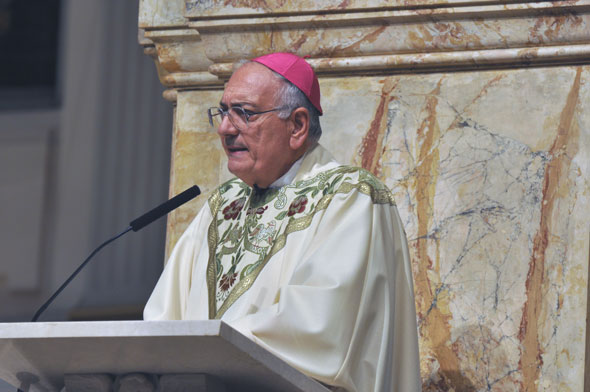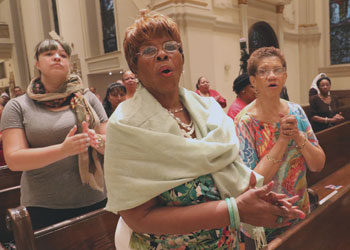
My dear brothers and sisters in the Lord,
This is the full text of Bishop DiMarzio’s homily at the Mass for Solidarity and Peace celebrated Aug. 24 at St. James Cathedral-Basilica, Downtown Brooklyn.
Tonight, we come to pray for the victims of terrorism; domestically in Charlottesville and internationally in Barcelona. We take our inspiration from the Old Testament reading from the Book of Daniel, the prophet, the one who was in the lion’s den. The situation takes place in the Babylonian exile of the Jewish people in the Seventh Century B.C. The lesson is one that Daniel teaches to the king, Nebuchadnezzar. The king had a vision of an idol; the head of the statue was pure gold, its chest and arms were silver, its belly and thighs bronze, the legs iron and its feet partly iron and partly tile. The common element is that the idol had feet of clay. Daniel interprets the dream for the king telling him that the clay symbolized the vulnerability of the Babylonian Empire and its eminent collapse.
We, too, as a people in the United States have feet of clay. It is not only the statues of Confederate heroes of the Civil War that have feet of clay, but so does our society. We should not tolerate monuments to people who were racists or tried to destroy our democracy. However, there are even many unanswered questions about Washington, Jefferson and now Christopher Columbus. We in the United States have our own particular original sin, it is called racism. And just as the Babylonian Empire one day fell, so too, we too, as a nation will fail to reach our potential if we do not address this pervasive fault.
Last week in Charlottesville, there were representatives of the Ku Klux Klan, and the Neo-Nazis, and the Alt Right, and white supremacists, and Anti-Semites, as well as every group that somehow has its roots in racist ideology. It is an ideology that says: I am better than others. But in fact, deep down it is a sense of inferiority that fuels racism. This flies in the face of our God-given knowledge that we are all created as children of God, and, as we profess in our country, we are all created equal. We have yet to put into practice what God teaches us and what our Nation professes.
We must remember, however, that no person is all bad. All people are God’s creation. And yet, people do the wrong things, they think the wrong things and they wrongly harm others. People are not evil. Rather, it is what people do that is evil. I am inspired by the forgiveness offered by the mother and father of Heather Heyer, the victim killed in Charlottesville, who offered forgiveness because they have a faith in God. We too must forgive. But this does not mean that we condone, nor that we cannot correct those who somehow have wandered away from the truth.

Racism remains the preeminent sin of not only our Nation, but also of our Church. In 1979, the United States Conference of Catholic Bishops issued a statement called, Brothers and Sisters to Us. The statement begins by saying, “Racism is an evil which endures in our society and in our Church. Despite apparent advances and even significant changes in the last two decades, the reality of racism remains. In large part it is only external appearances which have changed.” How important it is to recognize that racism, as the Bishops went on to say, “is not merely one sin among many; it is a radical evil that divides the human family and denies the new creation of a redeemed world. To struggle against it demands an equally radical transformation, in our own minds and hearts as well as the structure of our society.” Yes, we must look for radical change.
Tonight we should take inspiration from St. Peter Claver. He was a 17th-Century Jesuit priest who labored on the docks of Colombia baptizing literally thousands of slaves and ministering to their physical and spiritual needs. If he could have changed slavery, he would have done so. Instead, Peter Claver did whatever he could to alleviate the pain and suffering that came from the innate racism that allowed for slavery and changed the face of the United States.
Our own Msgr. Bernard Quinn was no stranger to the Ku Klux Klan and racism within the Church. The Klan burned down an orphanage he built for African-American children which is currently located within the confines of the Diocese of Rockville Centre, but at that time it was in the Diocese of Brooklyn. They did this not once, but twice, in the same year. Msgr. Quinn received numerous death threats. But he did not back down. He stood up to racism, and rebuilt. He was valiant, pledging to his parishioners, “I would willingly shed to the last drop my life’s blood for the least among you.” Msgr. Quinn has become our own diocesan hero. But he alone could not eradicate racism. And neither can we. However, we must do whatever is possible, as Msgr. Quinn and St. Peter Claver did, to make sure that racism is not a part and parcel of our own thinking.
To that end, I am establishing a diocesan commission for social justice, named after Msgr. Bernard Quinn. In the coming months, we will design our commission to deal with the social and religious problems that racism – in all of its forms – presents to us. The United States Conference of Catholics Bishops is also taking action. It just announced a new committee – the Ad Hoc Committee Against Racism – that will “challenge the sin of racism,” listen to those “suffering under this sin,” and encourage coming together in the love of Christ.
The Pontifical Council for Justice and Peace has written, “…racism still exists and continually reappears in different forms. It is a wound in humanity’s side that mysteriously remains open. Everyone, therefore, must make efforts to heal it with great firmness and patience.” The manifestations of racism in our country come in the form of xenophobia, or the fear of strangers. What it is, truly, is a fear of the changing face of America, which will soon no longer be a white majority country. The “browning” of America that we have heard about for the last 20 years has already happened. White supremacy is a futile fight against the evolution of our Nation. We see the violence against our immigrants, be they legal or undocumented. This violence all comes from the same root, the same racism that has yet to be expunged from our society and Church.
Our real home is in Heaven, remember. And it is only there that we will be free from Original Sin, that of our first parents, and that of our Nation. But in the meantime, while we live in exile, we can look to this evening’s Gospel, for an answer. Jesus preached the Beatitudes because He understood the human condition. He recognized and preached that victory does not depend on circumstances, but rather on the attitude of the faithful. For those poor in spirit, wealth did not matter. For those who mourned, especially those who decried the killing of the innocent, they would receive comfort in their own forgiveness of those who murdered their loved ones. Those who seek righteousness in the world, those who are willing to show mercy to others, are also those who conquer. If we are not clean of heart, if our hearts are not set on the things of God, we will never understand or live the Beatitudes, nor can we become the peacemakers who change the face of the earth, even during this time of exile. Yes, we may be persecuted, insulted, or even have false witness brought against us. But this is what Jesus calls us to do. Jesus calls us to be people who are blessed, blessed as we put into practice the revolutionary teaching that He gave to us.
We find ourselves here tonight, not coincidently but purposefully to celebrate the Eucharist, because the Eucharist is the food for exiles. We cannot obtain our heavenly destiny unless we are helped along the way by the bread of angels, which allows us to taste here on Earth the kingdom to come.
But this Eucharist must be something that we live day-in and day-out, not just something that we celebrate here in our churches. It must be that we too accompany every exiled person, everyone who experiences racism, and everyone who for any reason feels prejudice and marginalized in our world. We do not condone what is wrong. But because we are Christians, we assist anyone who is in need. We condemn no one, but we pray for their salvation.
The work of combating racism is not easy work. Together our resolve is strong. Join me in the Eucharist tonight as we pray for the courage to do what is before us.
